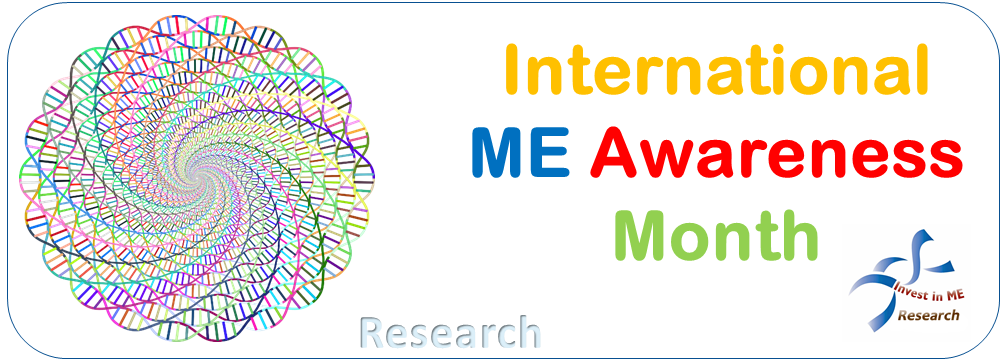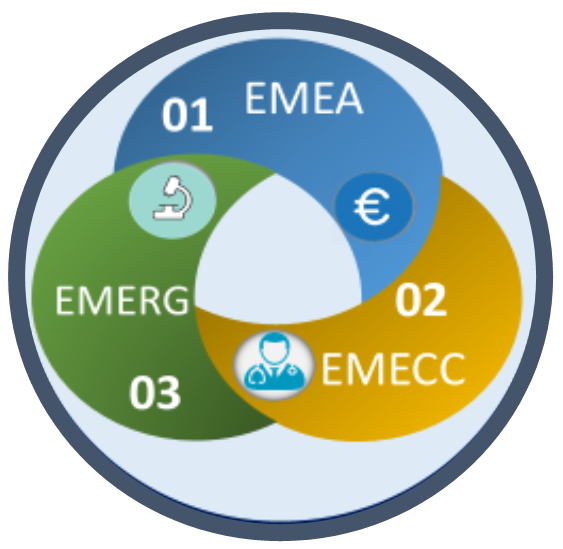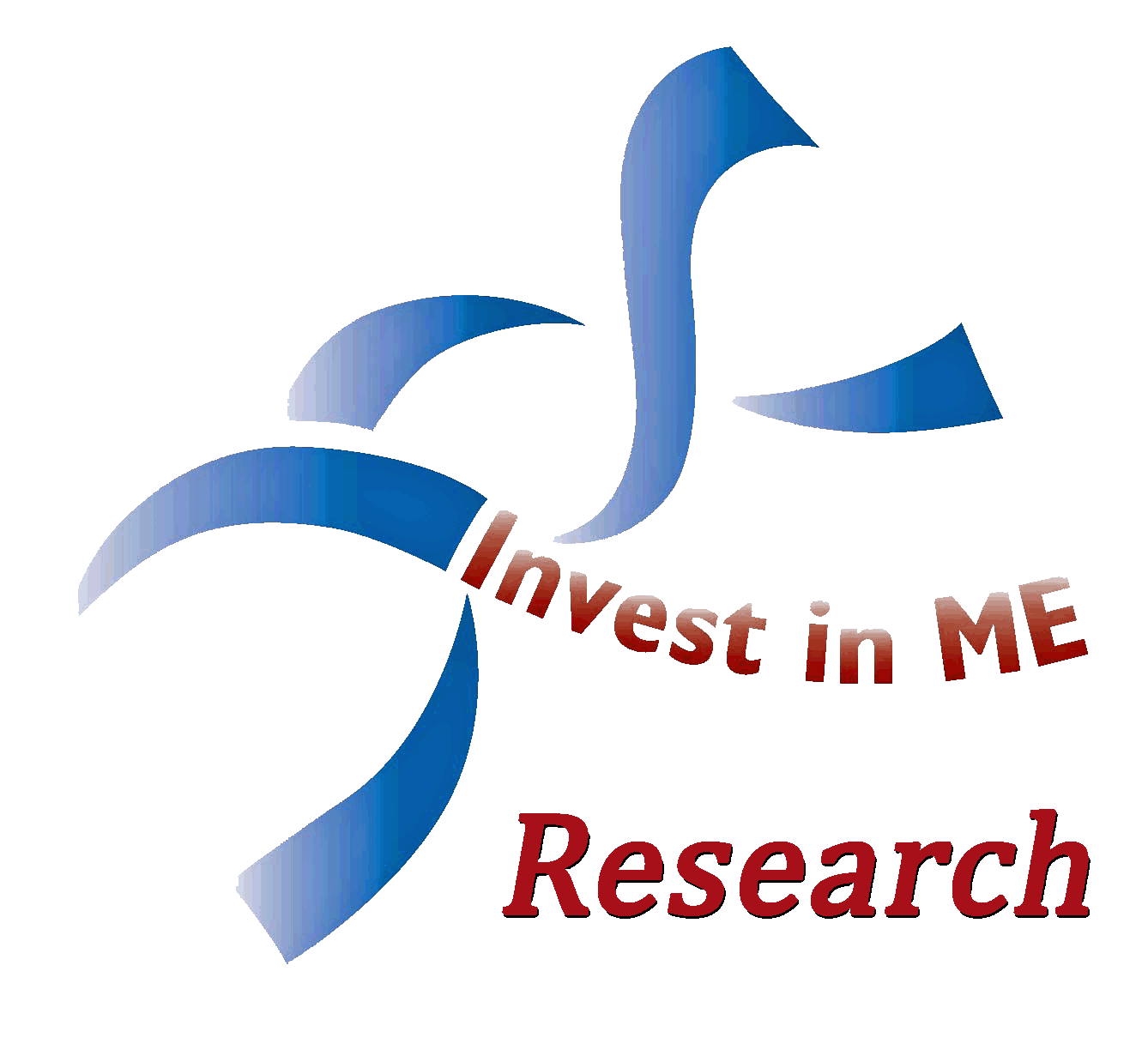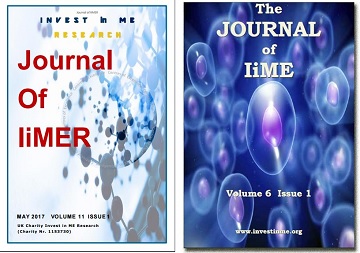ME AWARENESS MONTH MESSAGE from IiMER
#InvestinMEresearch2022
There can be a predictability about annual awareness campaigns, for whatever cause.
Often there is a danger that these become as much concerned with publicising the promoter as the cause itself.
For ME, raising awareness is often about publicity surrounding demands for change or action, demanding others act or alter policies.
Progress will not come merely from sound bites in the media or from letters to ministers or health services
or more videos - all cathartic actions that have been tried for years.
However much awareness may be raised, there is one incontovertible fact that remains - we still need to perform research in order to find treatments or cures.
Without research we remain in a world without the one factor that would overcome stigma, misinformation and flawed policies - scientific evidence.
And that leads to non-existent or poor services, apathy and indifference, and sometimes negligence - and an easy excuse to maintain the ignorance.
Of course, the intent of the charity is to make change happen, to bring hope for
people with ME and their families - and awareness is part of that process.
But publicity for the charity for its own sake is not an objective, but rather to raise awareness that we need evidence from research that allows us
to provide hope instead of hype.
Because we must acknowledge from years of experience that we cannot wait and expect others to act - we have to start some things ourselves and demonstrate what, and how
to do things.
The supporters we have who have made great strides in raising awareness and funds for research have, of course, achieved a great deal with their
amazing efforts year after year. These have allowed changes to come forth.
Yet, for an awareness month for ME, the core requirement needs to be highlighted.
In this way we also can bring attention to the actual issues that exist with ME.
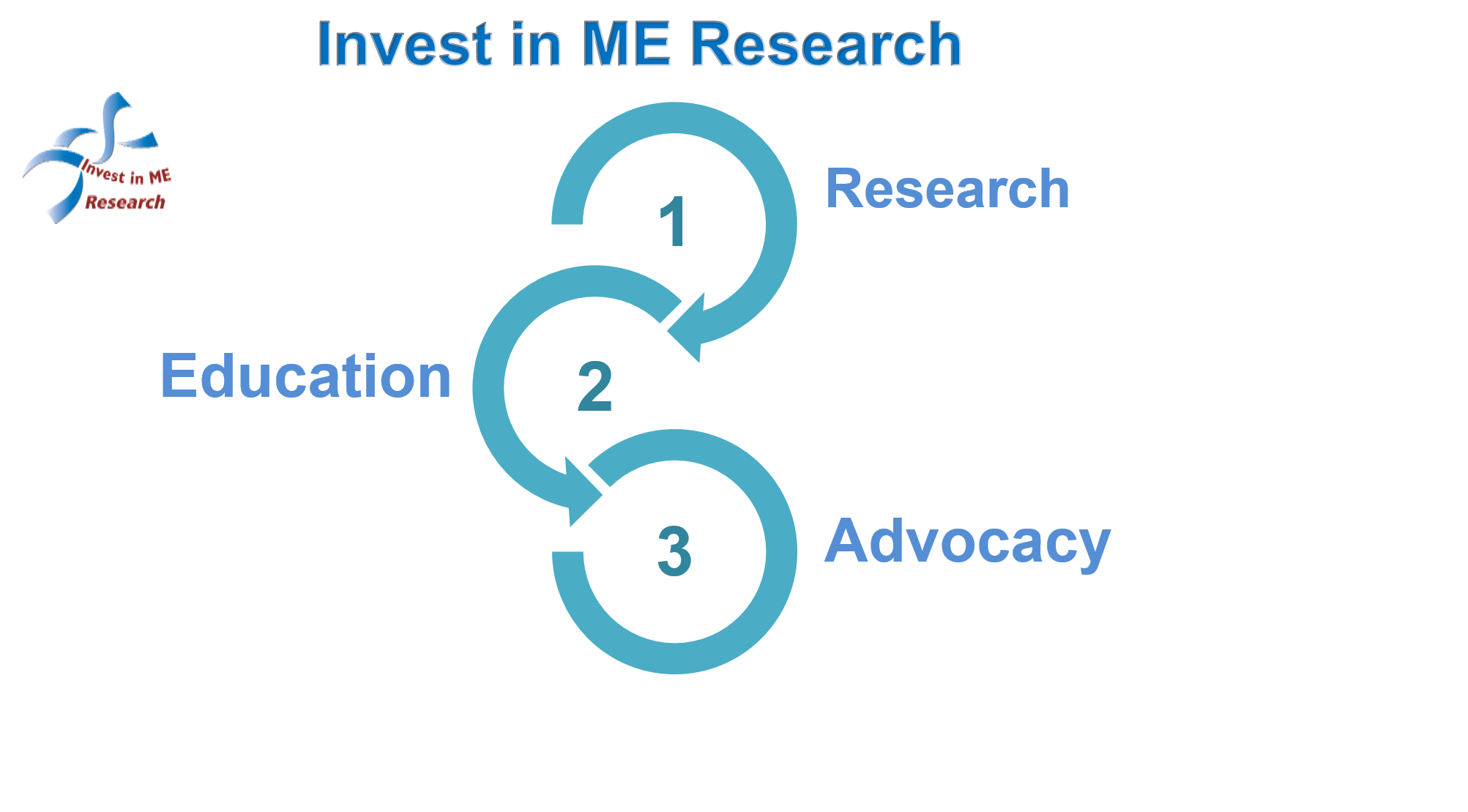
Objective: Sustaining and Developing the Foundations of Research into ME
As IiMER chairman Kathleen McCall has stated previously,
in order to treat and cure ME we need the infrastructure as well as funding.
A foundation for sustainable research needs to be created and we must recognise that, in its absence from official policies, then we are forced
to continue developing this ourselves.
To develop research we need a strategy - which is why we have proposed and funded the idea of a Centre of Excellence for ME in UK and Europe - a hub for
development of research ideas and collaboration.
We have spent a considerable amount of time and effort in promoting international collaboration, especially in Europe.
Sparse resources are currently allocated for ME, still so in the post Covid-19 era, so cross-European projects are necessary.
Europe has the resources to build and develop capacity and resources required for an appropriate level of research and services for ME patients.
Yet without research being performed and an infrastructure being developed then there will be no services, no treatments and possibly no change in the stigmatised perception of ME - making advocacy even more difficult and less likely to succeed - even despite the opportunities afforded by the funding directed to covid.
What are we doing
Our strategy has been to concentrate, as best as we can, on setting up some of the key building blocks that would create sustainable and permanent change in how ME is researched and treated.
- finding, funding and facilitating biomedical research into ME in a variety of ways
- creating solid foundations for a research programme on ME
- solving scientific questions relating to ME
- finding treatments that are based on research evidence
- raising standards on all levels of patient care
- facilitating European and international collaboration

What we are doing
The charity's proposal for a Centre of Excellence for ME is possible to achieve and it has set a target which can be reached if enough support is obtained.
Our plans to develop a Centre of Excellence for ME have captured the imagination and is clearly seen as the way ahead - and good progress on this foundation has been made, although with more resources this could be expedited for the benefit of all patients.
Why we are doing this
Resources for research into ME are scarce and funding has been negligible. This cascades onto the provision of services and treatments.
By developing a focal point for research, information and clinical care in Europe it allows
a more strategic and coordinated approach to research which can influence healthcare more easily than having a scattered approach
to research.
The benefits of this approach will, we are sure, save lives and could help restore or improve the lives of hundreds of thousands
of patients and their families.
What are the benefits?
What we are doing
A clinical trial which will raise the profile of ME and achieve scientific objectives
Why we are doing this
ME requires research. Only via biomedical research can treatments be developed.
What are the benefits?
- The only clinical trial for ME in the UK currently, and one of only a few in the world.
- It is being carried out by world class researchers in state of the art facilities in a leading research park in Europe.
- a cohort of patients will be recruited based on modern diagnostic criteria
- Treatment is tested in a blinded manner to guide future recommendations
- Research questions studied
- Biological samples stored in a biobank for future use
- Data collected and stored
- Patient registry created
- Introducing new researchers and clinicians to the field
- New outcome measures will be specified
- Ideas for other lines of research is bringing into the mix new researchers, a university and university hospital and a major ME clinic
- Raising public awareness and enormous publicity for ME
RESTORE-ME: A Quadram Institute based Clinical Trial in ME
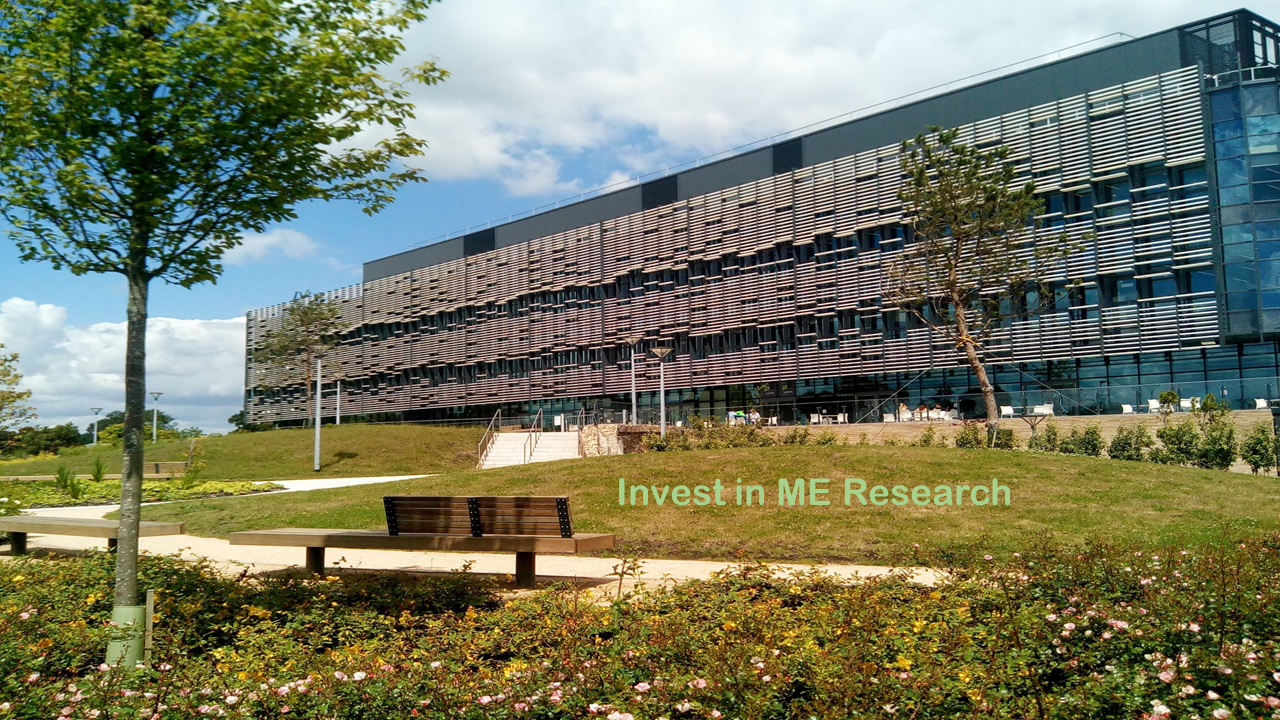
Bacteriotherapy and Clinical Trials
Purpose: To undertake a study to determine the effectiveness of faecal microbiome transplantation as a treatment for ME: The RESTORE-ME study
Aim: To determine if there is a cause and effect relationship between a dysbiotic intestinal microbiota and ME by determining if treatment by FMT can resolve ME symptoms.
The charity received an application and this has gone through an independent peer-review process satisfactorily.
Thanks to great supporters and very generous and wonderful support from The Hendrie Foundation the charity been able to fund fully the amount required for the trial to take place.
This project harnesses together practically all elements of the Centre of Excellence for ME and would be a showcase for ME clinical trial and research.
Read More
High-quality biomedical research from top researchers in the leading European research park
, complete with university and university hospital.
Further research is being built on top of the planned clinical trial which will allow us to perform more with the resourceswe have
and may lead to further discovery.
Further news coming soon.
Quadram Institute Read More
PhD students introduced to research (a strategic aspiration of 3 per year for 5 years) as part of the five year plan to implement the Centre
Read MoreThis trip really signified the culmination of the PhD journey; I was more than excited to visit Washington to present work on house-bound ME & represent @Invest_in_ME who funded my studentship. I wouldn’t have a PhD without the charity and support of the ME community - thank you. https://t.co/Lswk1CPb8y
— Dr. Daniel Vipond (@DanielVipond) May 5, 2019
A scheme for medical students to be involved in research into ME - at the Centre which allows them to have a sound knowledge of ME that will influence their peers and take that forward in their careers.
The charity has already funded several medical students to participate in research during their medical curriculum.
Apart from raising awareness and improving the knowledge of peers this has also
led to useful results -
https://quadram.ac.uk/do-the-answers-to-mecfs-lie-within-our-gut/
and
IIMEC10 Conference London
Read More
Requesting funding for research is not going to be productive if there is no infrastructure to support it.
The charity has instigated several initiatives to begin to build this presence in the absence
of a European strategy.
European Infrastructure Development
In 2015 Invest in ME Research formed (the European ME Research Group (#EMERG) to create a solid network and foundation for European collaboration and the creation of a joint strategy of biomedical research into ME.
In 2019 Invest in ME Research had also initiated the European ME Clinicians Council (#EMECC) - taking inspiration from the USA where Mary Dimmock and Dr Lucinda Bateman had organised the US Clinicians Council.
The European groups held successful meetings in 2019 and formed a Steering group that met in Amsterdam in 2020 to assess the status of the working groups that had been set up and plan for the future - prior to the pandemic affecting plans.
Invest in ME Research is a founder member of the European ME Alliance (EMEA)
The European ME Alliance is a grouping of European organisations who are involved in supporting patients
suffering from myalgic encephalomyelitis and are campaigning for funding for biomedical research to provide
treatments and cures for ME.
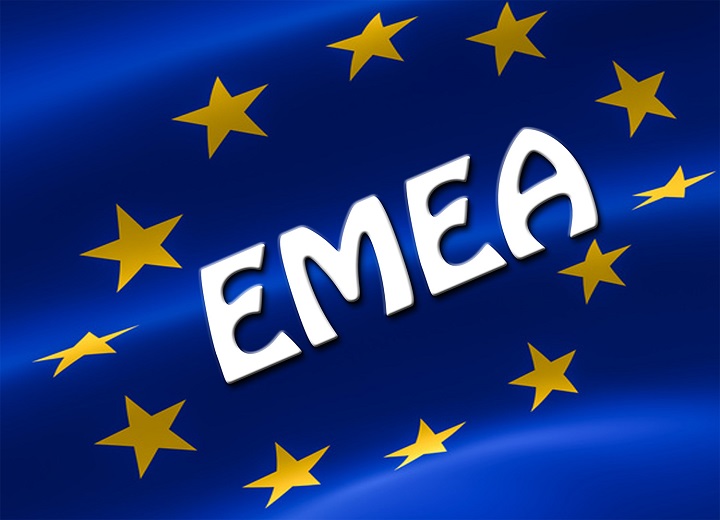
European ME Alliance (EMEA)
A European ME Research Group forming with collaboration and working together as themes - themes that have been the essence for our international research Colloquiums - with real international cooperation forming which can only lead to a better future for patients than would otherwise be the case.

European ME Research Group (EMERG)
EMERG brings together the foremost European ME researchers in order to establish an understanding of the Aetiology, Pathogenesis and Epidemiology of ME.
EMERG was intended to create a vision of collaborative European research to increase biomedical research into ME and provide an opportunity to make huge and rapid progress in ME research.
Many of the researchers have been meeting for years in the Invest in ME Research International Biomedical Research into ME Colloquiums events that have fostered collaboration, built new ideas and shared knowledge. The charity has emphasised world-wide international collaboration.
It has been increasingly evident, though, that we really do need a European base of research.
EMERG is currently working on research proposals including the post-Covid-19 situation.
EMERG is supported by the European ME patient groups and charities within the European ME Alliance (EMEA) to provide a powerful combination of campaigning, raising of awareness, building new research and accumulation of data based on collaboration and sharing of experiences and knowledge, which would allow rapid progress in the building up a strategy of high-quality research into ME.
European ME Clinicians Council (EMECC)
Invest in ME Research formed the European ME Clinicians Council (EMECC) in collaboration with leading European clinicians who are involved in treating people with Myalgic Encephalomyelitis.
This followed an American initiative that was started by Dr Lucinda Bateman and Mary Dimmock.
The inaugural meeting brought together clinicians in the field of ME to review the current state of knowledge, to present and discuss the latest initiatives, and to foster collaboration.
We wanted this to become a formal group that will work with the American initiative and be supported by European patient organisations - and crucially interact with European researchers in EMERG.
The EMECC initiative was designed to overlap with the EMERG meeting - bringing researchers and clinicians together and this is part of the European strategy created by IiMER and which, with the European ME Alliance, forms the nucleus of making rapid progress in research, education and advocacy for ME.
The group has continued to meet to develop the network so that it could improve the knowledge of clinicians in Europe and act as a focal point for healthcare agencies, doctors and media outlets who wish to learn more from experienced clinicians about ME.
Invest in ME Research wished to honour the memory and work of the Swedish ME patient and friend of IiMER, Anne Örtegren, by setting up
a joint UK-Swedish PhD studentship which would see the long-standing collaboration between Norwich and Uppsala University continue.
This is an initiative created by the charity that we had hoped would link the research of Professors Blomberg and Bergquist with the Norwich Centre.
Following the passing of Professor Blomberg earlier in 2019 then the project
is continuing within the European ME Research Group (EMERG) and with the collaboration between IiMER, Quadram Institute, University of East Anglia and Professor Bergquist at Uppsala University.
The PhD studentship is funded by Invest in ME Research and UEA.
UEA – Invest in ME Research European PhD Studentship

International Biomedical Research Colloquiums bringing researchers together.
The research Colloquiums now attract researchers from around the world to a meeting where
they are free to discuss, share ideas and collaborate.
Since 2011 the charity has been organising an annual international CPD-accedited biomedical research Colloquium on ME aimed at increasing international collaboration on research into ME.
In 2022 IiMER hopes to have the largest biomedical research into ME Colloquium in the world occurring in London in May.
Past BRMEC Colloquiums
The Invest in ME Research public Conferences began in 2006 – providing a platform for biomedical research into ME and to allow
researchers, clinicians and patients to come together and share experiences and knowledge
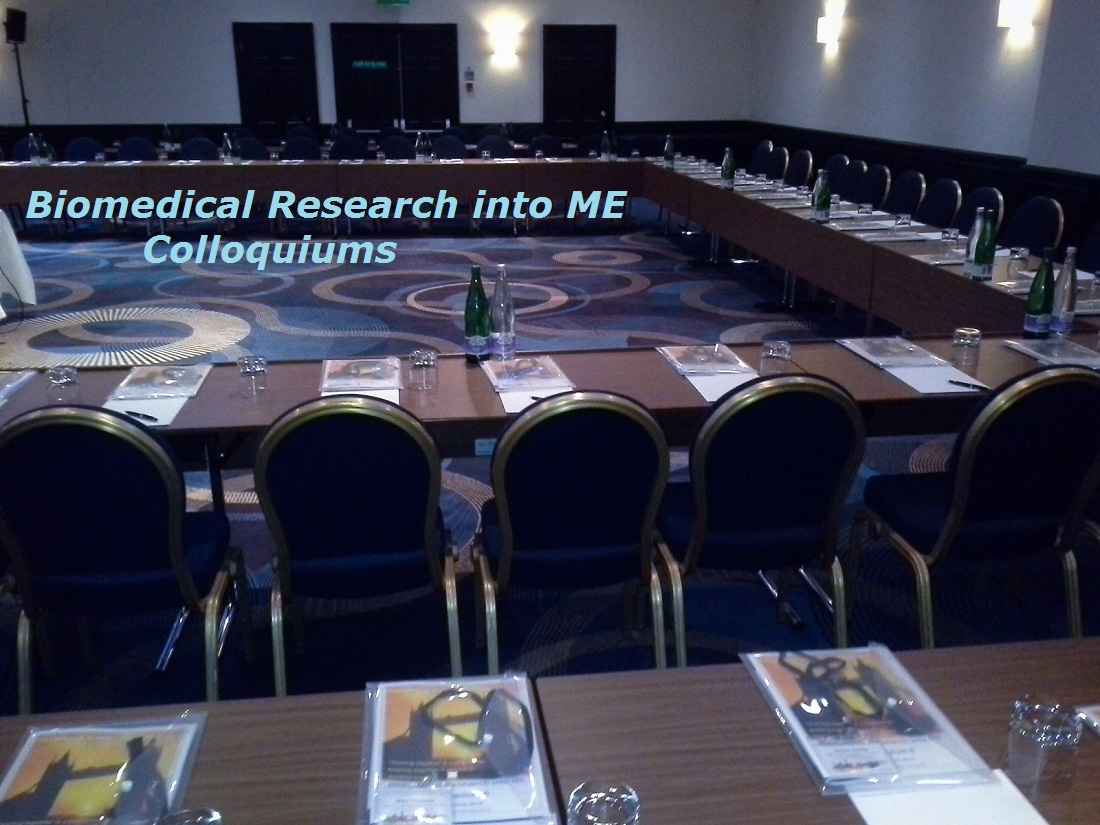 In 2011 the charity decided to create a forum for researchers – a place where international researchers could meet and discuss and collaborate.
In 2011 the charity decided to create a forum for researchers – a place where international researchers could meet and discuss and collaborate.
This formed our Biomedical Research into ME Colloquium – bringing together the best biomedical research from around the world and
facilitate the sharing of knowledge and develop ideas around biomedical research into ME - always in the heart of London.
This would create a family of international researchers who could work together for the benfir of people with ME.
The Colloquiums continue to grow in size every year and
now regularly attract
researchers from fifteen countries
and now sees the largest gathering of the world's biomedical researchers for ME in London with
excellent opportunities for networking amongst peers.
Past Colloquiums can be seen via the link below.
read moreInternational ME Conferences that allow researchers, clinicians, patient groups and carers to interact and network.
In 2022 we will organise Europe’s largest international ME conference open to the public - our fifteenth international ME conference that regularly brings together people from twenty different countries from around the world.
Since 2006 the charity has been arranging an annual international CPD-accedited biomedical research conference on ME.
The IiMER annual conferences and research colloquiums arranged by the charity now attract presenters, researchers, physicians, patient groups and journalists from around the world.
The charity has been attempting to move things forward over the years, as can be seen from the themes of the last fourteen conferences -
- #InvestinMEresearch (IIMEC14)
- Working Together (IIMEC13)
- Centres of Excellence for ME (IIMEC12)
- A New Decade of Invest in ME-Research (IIMEC11)
- Agents for Change (IIMEC10)
- Synergising Research into ME (IIMEC9)
- Mainstreaming ME Research (IIMEC8)
- Autoimmunity and ME (IIMEC7)
- The Way Forward for ME (IIMEC6)
- A New Era in ME/CFS Research (IIMEC5)
- Sub-Grouping and Treatments for ME/CFS (IIMEC4)
- Clinical Diagnosis, Research Trends & Educational Support (IIMEC3)
- Building a Future for Research into ME (IIMEC2)
- Initiating ME Research (IIMEC1)
Fifteen years of Research into ME
Thinking the Future for ME
- an international Network for Young ME Researchers
The Thinking the Future conferences were research meetings organised by the charity to encourage
biomedical research into ME and international collaboration amongst young and early career researchers.
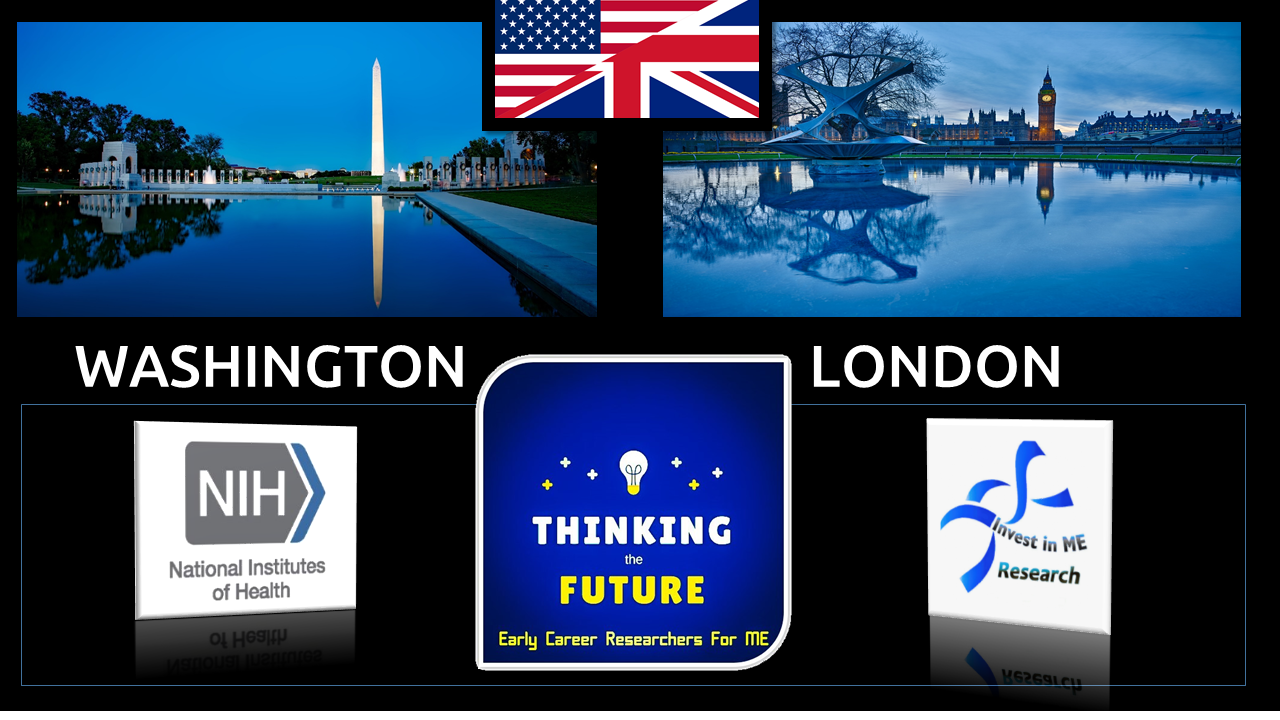
This was been a major objective of the charity.
An international family of researchers working together has been facilitated by the Invest in ME Research BRMEC* Biomedical Research
into ME Colloquiums held annually in London, UK.
To ensure that a foundation of biomedical research into ME can be sustained and to encourage
new ideas from new areas then we cannot rely just on this family of researchers that has been built up from all parts of the world.
We need to draw in knowledge and expertise from other areas – as we have been doing for many years with our
research Colloquiums and international Conferences.
Importantly, we also need to encourage early career researchers – and young researchers.
As part of the EMERG (European ME Research Group) concept - which aims to build a network of close European biomedical research collaboration to make rapid advances in research and funding for ME.
The establishment of the Thinking the Future for ME - Young/ECR Researcher network and conference began
as an idea in 2018 with a conference held in London.
The USA National Institutes of Health (NIH) worked with IiMER to facilitate this international network and
in 2019 conferences were held in both London and in Washington. The NIH
even provided funding for twenty young USA
researchers to come to London for TtF2019.

For a long time the charity has recognised that part of its strategy for improving the outlook for people with ME must
include improving clinical expertise in ME.
We feel this is best enacted via collaborations between knowledgeable clinicians who treat ME patients - sharing knowledge and integrating clinical expertise with a research strategy that closes the loop for translational biomedical research.
The European ME Clinicians Council (EMECC) group came into being following the initiative in USA by Mary and Dr Lucinda Bateman in setting up a USA Clinicians Coalition.
In 2020 IiMER initiated a new idea to create an international clinicians meeting in London with the
newly formed EMECC joining with the US Clinicians
Council formed by Mary Dimmock and Dr Lucinda Bateman.
This would bring together the two groups to facilitate a powerful instrument for change.
Due to the pandemic these plans have been delayed but are intended to resume in autumn 2021 and in London, in May 2022.
The charity has not forgotten the need for advocacy and regularly comments and acts on issues affecting ME.
The following documents are recent statements from the charity on major issues.
Some of the issues relating to the UK parliamentary debate on 24th January 2019
and a one page summary of recommendations
A status of ME document produced by the charity for the parliamentary meeting in 2018 that led up to the 2019 parliamentary debate in UK
Comments on NICE guidelines reviews and previous correspondence between the charity
and directors of NICE guidelines development
In the recent UK parliamentary debate on ME, Invest in ME Research produced a document which summarised the status of ME.
It also laid out a bold vision for research - proposing that £20 million be allocated every year for five years to kick-start
biomedical research and support the foundations that this small charity has laid.
Other topics -
Debate January 2019
Status of ME 2018
NICE Commentary
The charity has also engaged with the Chief Medical Officers of the UK, National Institute for Health and Care Excellence (NICE), the Department of Health, ministers and politicians, the Medical Research Council (MRH), the NHS, and the APPG group in parliament.
Read More

Donating money is just a part of philanthropy.
Philanthropy is about 'giving' - not just in monetary terms but also in non-monetary aspects, like time, ideas, raising awareness of what the charity is trying to do,
or being a volunteer.
Our supporters deserve recognition for all their support and efforts to bring change to the landscape of ME research and perception and we are justifiably proud of what our supporters have achieved.
Due to imaginative and positive support such as the Let’s Do It for ME campaign and thanks to dedicated supporters the charity preparing for the post-pandemic period with good foundations for progress based on the efforts of patients, carers and their families who have supported us since 2005.
In order to bring the best research to bear on ME and make progress in clinical expertise, education and development of treatments
we welcome all support for our work.
Click here for ways to help - fund.shtml


ME Awareness Month
In May awareness month we invite support to help us continue to build on the above elements which will facilitate rapid progress in improving research and treatment of ME.
We invite support for the only May Awareness Month theme that makes sense -
